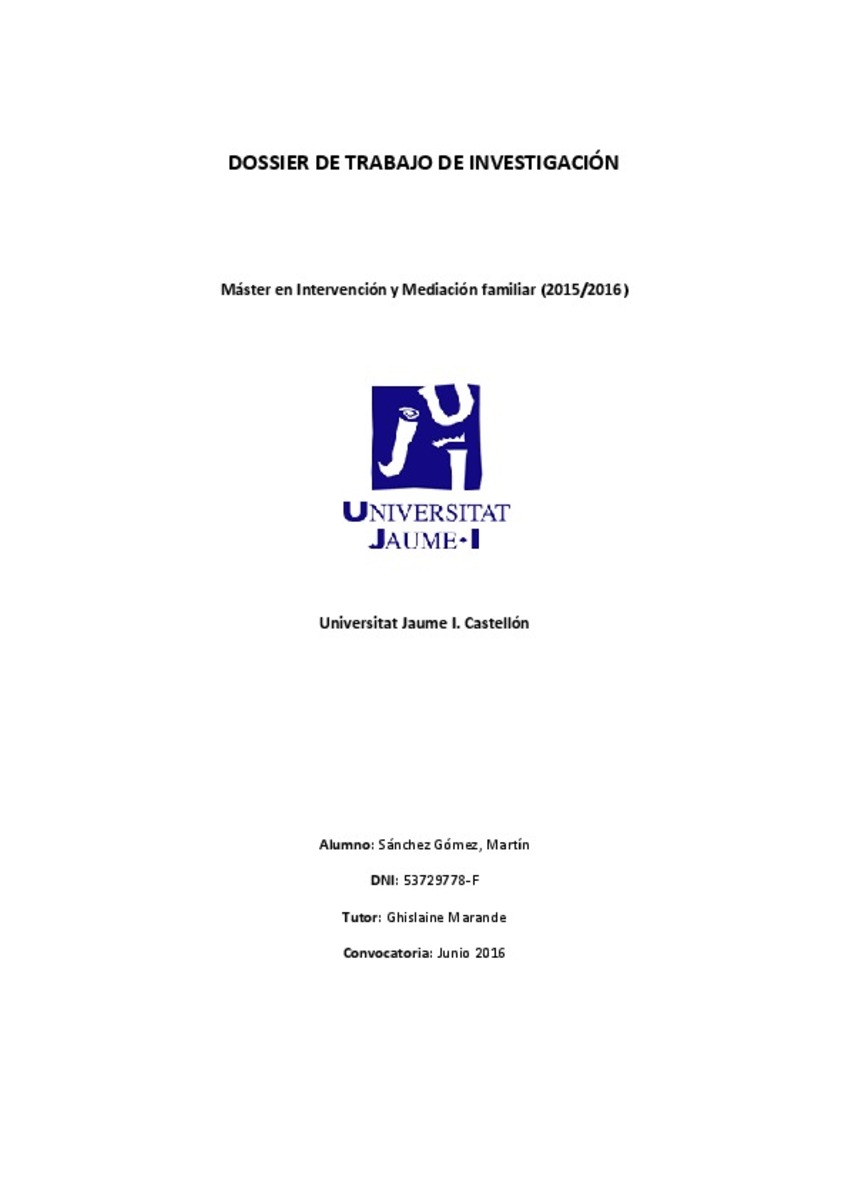Mostrar el registro sencillo del ítem
Conexiones del rechazo, el autoconcepto y el rendimiento académico con la inteligencia emocional
| dc.contributor | Marande Perrin, Ghislaine | |
| dc.contributor.author | Sanchez-Gomez, Martin | |
| dc.contributor.other | Universitat Jaume I. Departament de Psicologia Evolutiva, Educativa, Social i Metodologia | |
| dc.date.accessioned | 2016-07-22T11:03:43Z | |
| dc.date.available | 2016-07-22T11:03:43Z | |
| dc.date.issued | 2016-06-28 | |
| dc.identifier.uri | http://hdl.handle.net/10234/161878 | |
| dc.description | Treball final de Màster Universitari en Intervenció i Mediació Familiar. Codi: SBD016. Curs acadèmic 2015-2016 | ca_CA |
| dc.description.abstract | En los últimos años, una de las líneas de investigación que más interés ha generado dentro del contexto educativo ha sido el análisis del papel que juegan las emociones en el aula y, sobre todo, su relación con la adaptación escolar y el éxito académico de los estudiantes. El estudio que aquí presentamos pretende continuar la línea de las investigaciones realizadas previamente con el propósito de analizar la relación de la inteligencia emocional (IE) con el rechazo, el autoconcepto y el rendimiento académico. La muestra de esta investigación está compuesta por 203 alumnos de educación secundaria de entre 9 y 11 años. Tras analizar los resultados obtenidos en este estudio podemos afirmar que están en la línea de las investigaciones previas y defienden la relación de la IE con la aceptación grupal, el autoconcepto positivo y el rendimiento académico. Los alumnos que reciben más nominaciones positivas, muestran mayores puntuaciones en autopercepción física y global; y obtienen evaluaciones académicas superiores, presentan puntuaciones más altas en IE percibida, principalmente en los factores de Adaptabilidad y Manejo del estrés. En la parte final de la investigación se discuten las implicaciones prácticas de los resultados obtenidos. | ca_CA |
| dc.description.abstract | A research line that has generated a lot of interest in the last years, within the field of education, is the analysis of the role that emotions play in the educational context, and, moreover, the relation between Emotional Intelligence (EI) variable and self-esteem, rejection and academic performance of the students. The study presented here aims to continue in line with previous studies in order to analyze the relationship between emotional intelligence and academic achievement and sociometric type of students. The sample of this research consists of 203 high school students aged 9 to 11 years. The analysis of results obtained in this study can state that are in line with previous investigations and defend the relationship of IE with group acceptance, positive self-concept and academic performance. Students who receive more positive nominations, show higher scores on physical and overall self-perception; and obtain higher academic assessments, have higher scores in perceived IE, mainly on factors Adaptability and Stress Management. In the final part of the research the practical implications of the results are discussed. | ca_CA |
| dc.format.extent | 32 p. | ca_CA |
| dc.format.mimetype | application/pdf | ca_CA |
| dc.language.iso | spa | ca_CA |
| dc.publisher | Universitat Jaume I | ca_CA |
| dc.rights.uri | http://rightsstatements.org/vocab/CNE/1.0/ | * |
| dc.subject | Màster Universitari en Intervenció i Mediació Familiar | ca_CA |
| dc.subject | Máster Universitario en Intervención y Mediación Familiar | ca_CA |
| dc.subject | Master's Degree in Family Intervention and Mediation | ca_CA |
| dc.subject | Inteligencia emocional | ca_CA |
| dc.subject | Rendimiento académico | ca_CA |
| dc.subject | Adaptación escolar | ca_CA |
| dc.subject | Autoconcepto | ca_CA |
| dc.subject | Rechazo | ca_CA |
| dc.subject | Emotional intelligence | ca_CA |
| dc.subject | Academic performance | ca_CA |
| dc.subject | School adaptation | ca_CA |
| dc.subject | Self-esteem | ca_CA |
| dc.subject | Rejection | ca_CA |
| dc.title | Conexiones del rechazo, el autoconcepto y el rendimiento académico con la inteligencia emocional | ca_CA |
| dc.type | info:eu-repo/semantics/masterThesis | ca_CA |
| dc.educationLevel | Estudios de Postgrado | ca_CA |
| dc.rights.accessRights | info:eu-repo/semantics/openAccess | ca_CA |
Ficheros en el ítem
Este ítem aparece en la(s) siguiente(s) colección(ones)
-
TFM: Màster Universitari en Intervenció i Mediació Familiar [211]
SAF036, SAF037, SBD016







